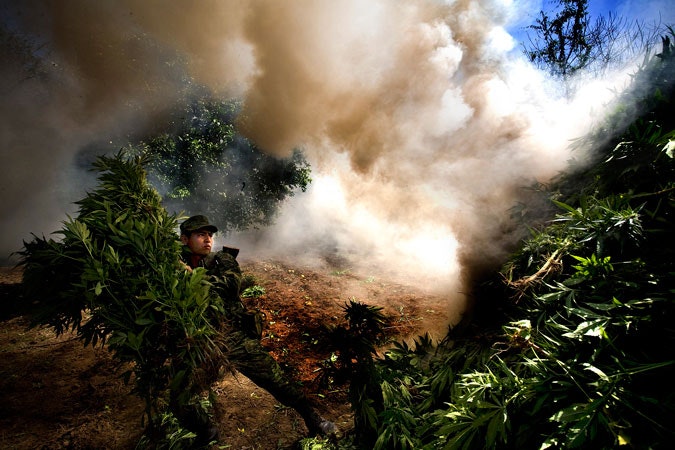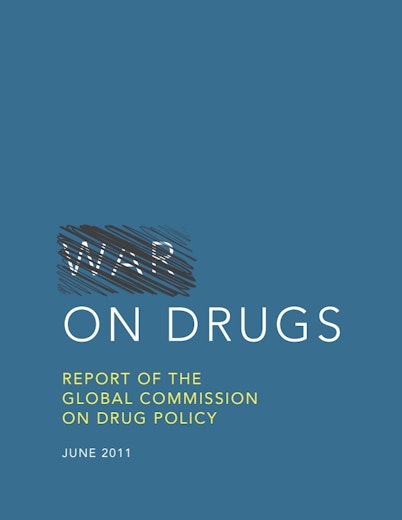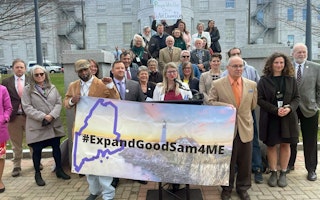Interview with President Fernando Henrique Cardoso of the Global Commission on Drug Policy
By Maciej Stasiński & Fernando Henrique Cardoso

The Global Commission on Drug Policy met this week in Warsaw. This interview with commissioner and former president of Brazil, Fernando Henrique Cardoso, was originally published in the Polish newspaper Gazeta Wyborcza.
Why is the Global Commission needed?
Drugs are a problem surrounded by fear, prejudice and misconceptions. Most people, including parents and teachers, are afraid to talk about drugs. It is the same with politicians. An independent Global Commission, composed of former political leaders and public intellectuals, is well positioned to break the taboo about this problem that affects millions of people and proclaim loud and clear that the so-called ‘war on drugs’ is not the right answer.
The prohibition and criminalization of all drugs is a costly failure. It does not reduce consumption nor safeguard people’s health.
Drug trafficking is a crime but drug consumption is a health problem. Drugs cannot be eradicated by force but the harm they cause to people and societies can be significantly reduced.
Why is the War on Drugs wrong (morally, socially, legally)?
The facts speak for themselves. Forty years of strenuous efforts have failed to reduce the production and consumption of illicit drugs. Wherever there is established demand for a consumer product, there will be a supply. The only beneficiaries of prohibition are the drug cartels.
Where has the war specifically failed?
The war on drugs does more harm than good. In many parts of the world, especially in Latin America and West Africa, prohibition-related violence and corruption have become a major threat to public safety and the stability of democratic institutions.
What are the advantages of the new policy advocated by the Commission? What is the experience of those countries where it has already been tested telling us?
The primary objective of drug control policies should be protecting the young, seeking by all means to prevent drug abuse and addiction. This requires increased investments in prevention, treatment and social reintegration.
Such approach does not exclude repression. But law enforcement by the state and the social and cultural pressure of society should be targeted to fighting against organized crime – rather than persecuting people in need of treatment.
To implement this policy shift, the Global Commission has formulated two key recommendations. The first is to end the criminalization and stigmatization of people who use drugs. People who are dependent on drug use are not criminals to be incarcerated but patients to be treated and rehabilitated.
Our second recommendation is to encourage governments to experiment with different models of legal regulation of drugs, such as marijuana, in similar ways to what is already done with tobacco and alcohol.
The most advanced medical research demonstrates that marijuana is a less harmful drug than tobacco or alcohol. The stunning reduction in the consumption of tobacco in Europe and the Americas shows that prevention and regulation are more efficient than prohibition and punishment.
Regulation cuts the link between traffickers and consumers, facilitating access to treatment. It also enables the imposition by the state of all kinds of restrictions and limitations on the production, trade, advertising and consumption of a given substance to deglamorize, discourage and control its use.
This is the policy already adopted by European countries such as Portugal, Switzerland and the Czech Republic, with remarkable results in terms of reducing deaths by overdose and contamination by HIV/AIDS. Contrary to widespread fears regulation also facilitates prevention which is essential to reduce consumption.
In recent months, the pace of change accelerated in Latin America. The presidents of Colombia, Mexico and Guatemala, countries which have been at the forefront of the drug wars, have publically called for alternative solutions to be put on the table. Argentina, Brazil, Colombia, Ecuador, Mexico and Uruguay passed laws decriminalizing drug possession for personal consumption. Several U.S. states are experimenting with the medical uses of marijuana.
The taboo has clearly been broken and it is time to take this debate about more effective policies to the global level. The Global Commission’s upcoming meeting in Warsaw will look into the dramatic human and social consequences of the prevailing hardline approach to drugs in Eastern Europe, Africa and Asia.
What are the main obstacles to the new concept of drug policy being accepted both at national and world’s level? Is it prejudice or interests? Political or economic?
Drugs are a complex and controversial problem. We are fighting both prejudices and vested interests. There is not a single solution that can be applied everywhere. We are building our case for change on the basis of the best medical evidence and the example of countries which have successfully experimented with different policies. It will then be up to each country to come up with the policy alternatives more appropriate to its history and culture.
President Cardoso, President Kwasniewski has followed your lead in admitting that he made a mistake, when he signed Poland’s punitive drug law in 2000. What advice do you have for him for his future engagement?
It takes courage for a political leader to change his mind and acknowledge the failure of a policy that enjoyed broad popular support. But that is exactly what true leaders are expected to do. During my two terms as president of Brazil, from 1995 to 2002, I accepted the prevailing idea that outright repression was the answer to the drug problem. I was proved wrong. This realization did not come as an illumination but rather as the outcome of a hard process of being exposed to the sufferings imposed on people and societies by a misguided policy.
I am certain that President Kwasniewski has not come lightly to the conclusion regarding the urgency of replacing the failed prohibitionist approach with a new set of policies that emphasize prevention and treatment over outright repression.
I fully support his courageous decision to promote the debate about alternative policies and commend his decision to stay engaged not only in Poland but also East of Poland where the convergence of repressive drug policies and contamination by HIV/AIDS is such a grave and urgent problem.
Now that the taboo that prevented serious discussion about drugs has been broken it is time to take the debate to the global level. The Global Commission’s upcoming meeting in Warsaw will look into the dramatic human and social consequences of the prevailing hardline approach to drugs in Eastern Europe, Africa and Asia. Our common goal is to undermine the power organized crime and safeguard people’s health and citizen security.
Maciej Stasiński is an editor and journalist for Gazeta Wyborcza.
Fernando Henrique Cardoso is former president of Brazil.


